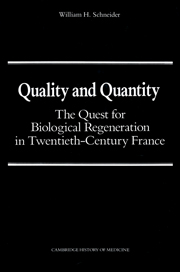Book contents
- Frontmatter
- Contents
- Preface
- 1 Introduction
- 2 Degeneration and regeneration
- 3 From puericulture to eugenics
- 4 The French Eugenics Society up to 1920
- 5 Postwar eugenics and social hygiene
- 6 The campaign for a premarital examination law
- 7 French eugenics in the 1930s
- 8 Eugenics, race, and blood
- 9 Race and immigration
- 10 Vichy and eugenics
- 11 Conclusion
- Notes
- Selected bibliography
- Index
5 - Postwar eugenics and social hygiene
Published online by Cambridge University Press: 10 March 2010
- Frontmatter
- Contents
- Preface
- 1 Introduction
- 2 Degeneration and regeneration
- 3 From puericulture to eugenics
- 4 The French Eugenics Society up to 1920
- 5 Postwar eugenics and social hygiene
- 6 The campaign for a premarital examination law
- 7 French eugenics in the 1930s
- 8 Eugenics, race, and blood
- 9 Race and immigration
- 10 Vichy and eugenics
- 11 Conclusion
- Notes
- Selected bibliography
- Index
Summary
The First World War cut short the initial phase of vigorous activity by the organized eugenics movement in France. Begun as a learned society with nearly regular monthly meetings and publication of a review, the French Eugenics Society attracted a wide range of interested parties and ideas. The society was in close touch with eugenicists in other countries, and exchanged visits with major proponents in both England and the United States. In fact, the French participation in the international movement was such that the Second International Eugenics Congress was scheduled to be held in Paris in 1915.
All of this was changed, of course, by the First World War. Meetings and publications of the French Eugenics Society were immediately suspended, and not resumed until after the war. Only occasional articles appeared on eugenics in other French journals, as the war completely absorbed the attention of the nation. The most far-reaching result of the war for eugenicists, as for most others, came from the loss of life that made the fear of depopulation an even greater concern than it had been at the turn of the century. In one sense, this heightened awareness of the population problem made people generally more open to the ideas eugenicists had talked about before the war. This is reflected in the many private initiatives begun after 1920 that, when added to the sharp increase in government involvement in everyday life that carried over from the war, blurred the distinction between private and public spheres that had made some people wary of eugenics before the war.
- Type
- Chapter
- Information
- Quality and QuantityThe Quest for Biological Regeneration in Twentieth-Century France, pp. 116 - 145Publisher: Cambridge University PressPrint publication year: 1990



